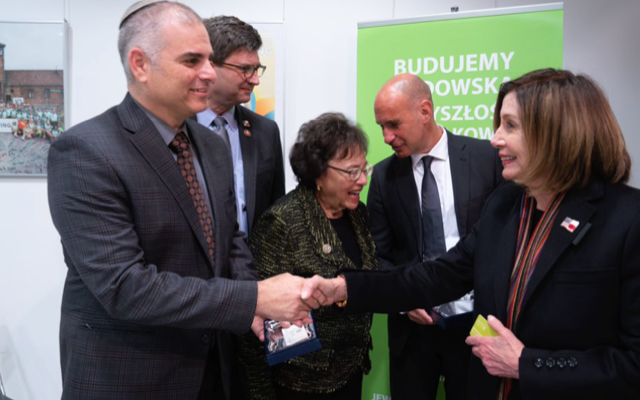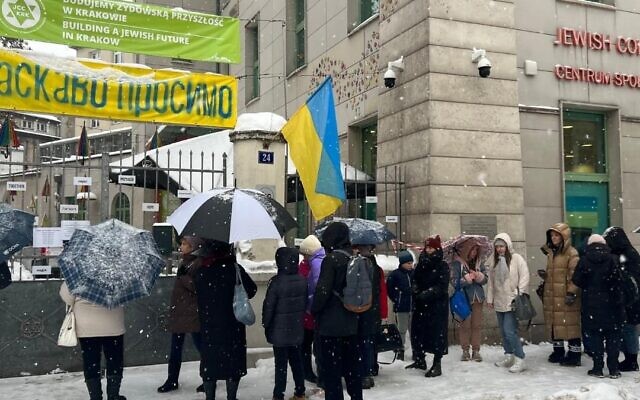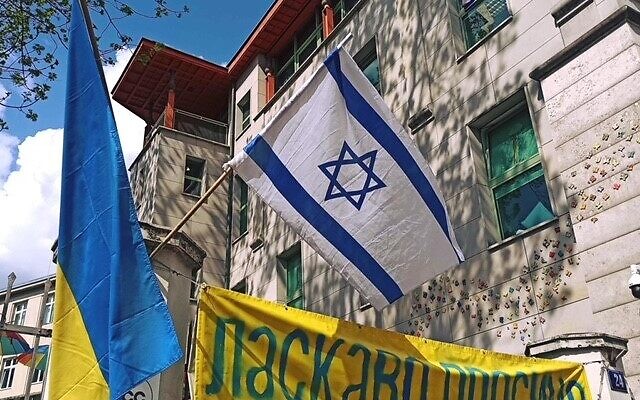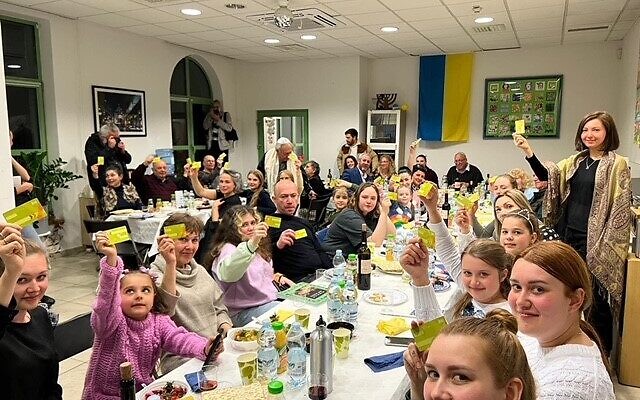Kaplan Played Key Role With Ukraine Refugees
Former Federation worker spent more than two years as staffer at Krakow JCC.
In 2019, when Ryan Kaplan signed up for a year-long fellowship with the Jewish Service Corps, he had no idea that it would land him in the middle of history. The 30-year old Kaplan, who went to Riverwood High School in Sandy Springs and Georgia State University, was working as a fundraiser for the Jewish Federation of Greater Atlanta when he first learned of the program.
“Essentially, it was billed to me as a kind of Jewish Peace Corps. It’s mostly volunteer work. They pay you, but it’s a modest stipend, nothing you could really put in the bank. I studied abroad when I was in college, so it sounded like a great way to spend a year.”
With his background in marketing and his five years of experience at the Federation, officials with the American Joint Distribution Committee, which runs the program, thought Kaplan would be a good fit to serve as the director of external communications at the Jewish Community Center in Krakow, Poland. He could write press releases and post the latest news from the center on its social media platform, while, at the same time, learning about the small but growing Jewish community that was before the Holocaust, a thriving center of Eastern European Jewry.

What had once been a community of 38,000 Jews with seven synagogues and a lively Jewish quarter, was down to less than 750, many of whom had only in recent years discovered their Jewish heritage. But under the skillful leadership of a 52-year-old American from Forest Hills, N.Y., Jonathan Ornstein, the program was thriving. Ornstein had first gone to Krakow 23 years ago as a lecturer in Jewish studies at the local university. In 2008, he was hired to run the small Jewish community center and, in the years since, had built it into an impressive modern center that boasts a busy daily program of activities, a non-denominational pre-school, and a yearly budget of nearly $3 million.
Three years ago, it hosted a congressional delegation headed by the Democratic leader, Nancy Pelosi. She was just one of nearly 140,000 annual visitors to the center, who are attracted by the city’s massive Jewish Cultural Festival and to stop on the way to visit the infamous concentration camp, Auschwitz, located only 60 miles away. Krakow played a major role in the Steven Spielberg film, “Schindler’s List,” and Oscar Schindler’s factory that saved more than 1,200 Jews is today a popular tourist attraction.
But all that history came to a screeching halt in 2020, when Kaplan found himself in the middle of the COVID pandemic, when he also found himself helping to save Jewish lives in Krakow. This time, however, it was the dozens of elderly Holocaust survivors who had returned to the city after World War II. Their fragile existence was now not threatened by murderous Nazi soldiers but by a virulent pandemic that tore through aged communities all over the world.
“About 50 Holocaust survivors relied on the JCC for a lot of different services. They had their own dedicated space and their own kitchen for meals. When the pandemic hit, the first priority was making sure they were taken care of. We were feeding them in their home, bringing them medicine and even providing emergency dental services. We saved a lot of lives,” Kaplan said.
But the lifesaving operation was just starting. As the pandemic began to subside earlier this year, the Russian invasion of Ukraine brought a new level of uncertainty. Ukraine’s border with Poland is only a three-hour drive from Krakow.

“It was very scary the first few weeks. A Russian missile was fired across the border and NATO was getting involved. We were very, very scared about something like that happening. Poland had had it really hard since the end of World War II. We were worried that the Russian aggression would creep further west.”
It was very scary the first few weeks. A Russian missile was fired across the border and NATO was getting involved. We were very, very scared about something like that happening. Poland had had it really hard since the end of World War II. We were worried that the Russian aggression would creep further west.
But as the Ukrainians demonstrated their resolve to stand up to the Russians, some of the initial fears began to be replaced by a determination to help those Ukrainians who were there fighting. Kaplan said that everyone, Jews and non-Jews, Poles and Americans, “understood the gravity of the situation and wanted to help.” The Krakow JCC became one of three major centers in the city that provided nearly around-the-clock assistance to refugees.
“The fact that we were so close to Ukraine and were in a position to help was really empowering. And I think that the reason that the response was so strong in Poland was because generations had grown up hearing how awful the Russians had been after they liberated the country from the Nazis. Any chance of that returning was really scary and people were ready to make moves against it,” Kaplan said.

For many Ukrainians, the Krakow Community Center became their first stop. Kaplan and the staff there worked 20-hour days, providing humanitarian assistance and a full range of services to the refugees. It was also the first stop for the international aid organizations that suddenly flooded into the country. The Krakow JCC’s budget nearly doubled.
“The fact that our small community was able to provide the level of assistance to hundreds of thousands of people, I would say was a modern miracle.”
Kaplan returned to Atlanta late last year to take a development job at Children’s Healthcare of Atlanta, but his memories of what he helped accomplish are still strong.
“My pride in the Jewish people and the international Jewish community has never been stronger. That, for me, is what stays with me.”
- News
- Community
- Bob Bahr
- Ryan Kaplan
- Jewish Service Corps
- Riverwood High School
- Georgia state university
- jewish federation of greater atlanta
- American Joint Distribution Committee
- Jewish Community Center
- Krakow
- Poland
- holocaust
- Jonathan Ornstein
- Nancy Pelosi
- Jewish Cultural Festival
- Auschwitz
- Steven Spielberg
- Schindler's List
- russia
- Ukraine
- Putin
- Zelensky
- Children's Healthcare of Atlanta




comments